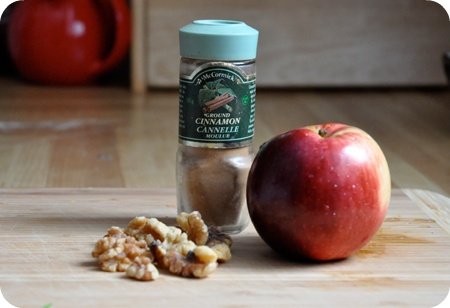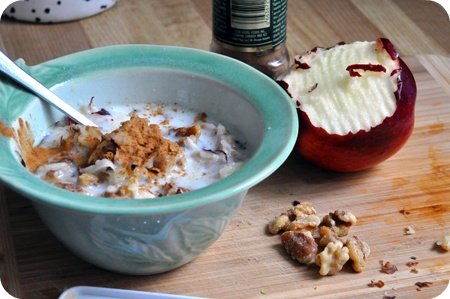In yesterday’s post I mentioned oatmeal. I would like to expand on the oatmeal theme for a little bit.
Oatmeal in itself is not that exciting, it’s what you add to it that makes it exciting. I know this is a hot topic among some of you because the last time I wrote about it (during the Blue Menu Healthy Eating Challenge, remember that?) I realized that Oatmeal Is Big News.
During the Sugar Fast I realized that sometimes I really needed something hot to fill me up and I quickly learned that oatmeal does the trick really nicely.
I have also learned something valuable about grains in general. Aside from couscous (which is a tiny and granular grain) if oatmeal or rice is labelled with words like “quick” or “instant” … you don’t want it. The reason you are able to cook it so quickly is that all of the healthy stuff has been stripped away all in the name of convenience. ISN’T THAT HELPFUL.
In my view, the longer the oats takes to cook, the less processed they are, and the better they are for you.
“Research show that eating oats, oat bran and oatmeal helps lower elevated blood cholesterol level thanks to their special type of soluble fibre, called beta-glucan. This soluble fibre also helps stabilize blood sugar levels by reducing spikes and dips, especially in people with type 2 diabetes. Large flake and steel-cut oats … are low glycemic foods, meaning they’re slowly digested and gradually released as sugar into the bloodstream.” (from this site)
Enter STEEL CUT OATMEAL. Have you ever had steel cut oatmeal? If you’ve grown up (like me) eating cream of wheat (gag) and oatmeal from a little packet YOU WILL NOT KNOW WHAT HIT YOU.
Steel cut oats aren’t difficult to prepare. They take about 25 minutes to cook (and they practically cook themselves), and are slightly chewy when they’re done. The time spend is totally worth it.
This is what I was adding to my oats during the sugar fast:
And here’s what the end result looked like:
I like drowning the whole thing with a bit of 1% milk. The walnuts added a lovely bit of crunch, and the grated apple adds a surprising amount of sweetness. Totally yummy.
It’s worth repeating, there was no added sugar in these oats, although admittedly it’s very good with raisins and a bit of brown sugar.
It makes a delicious and filling breakfast. In fact, I think I’ll go make some right now.




